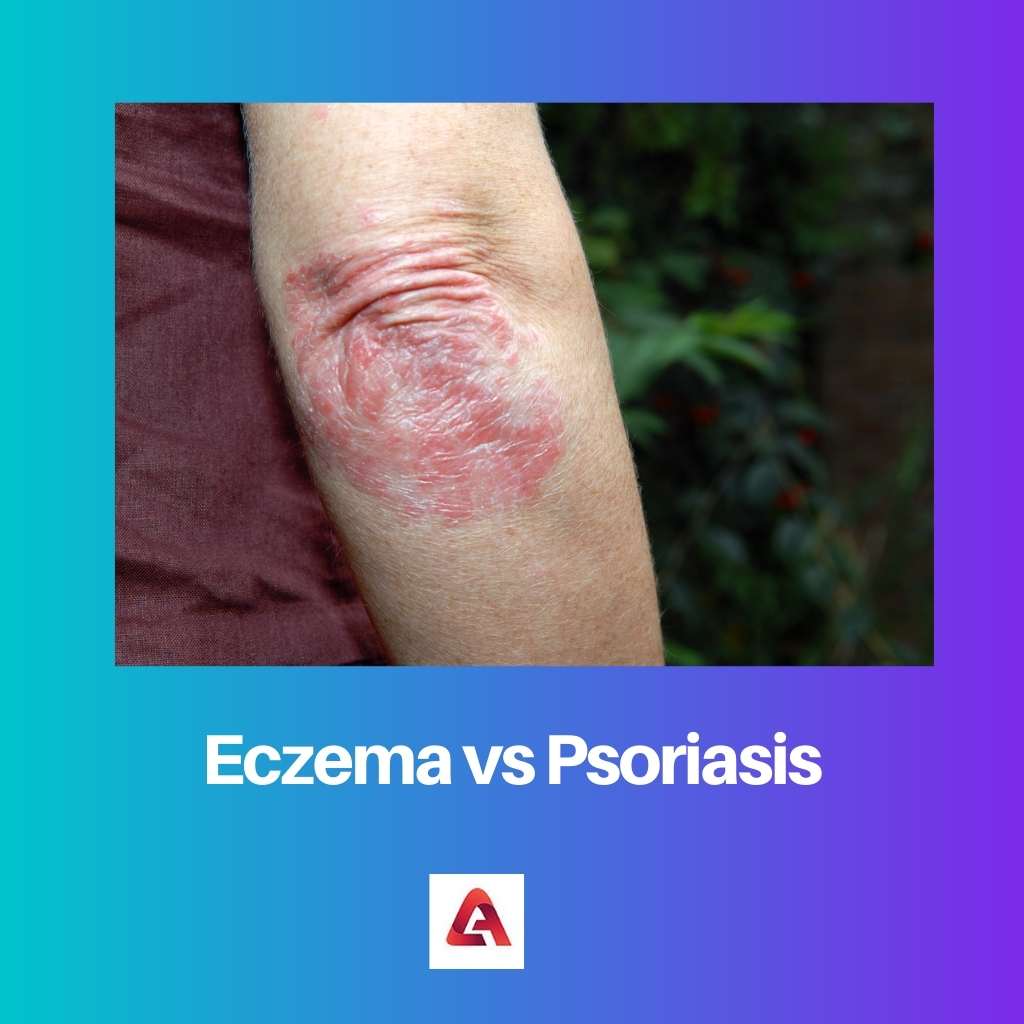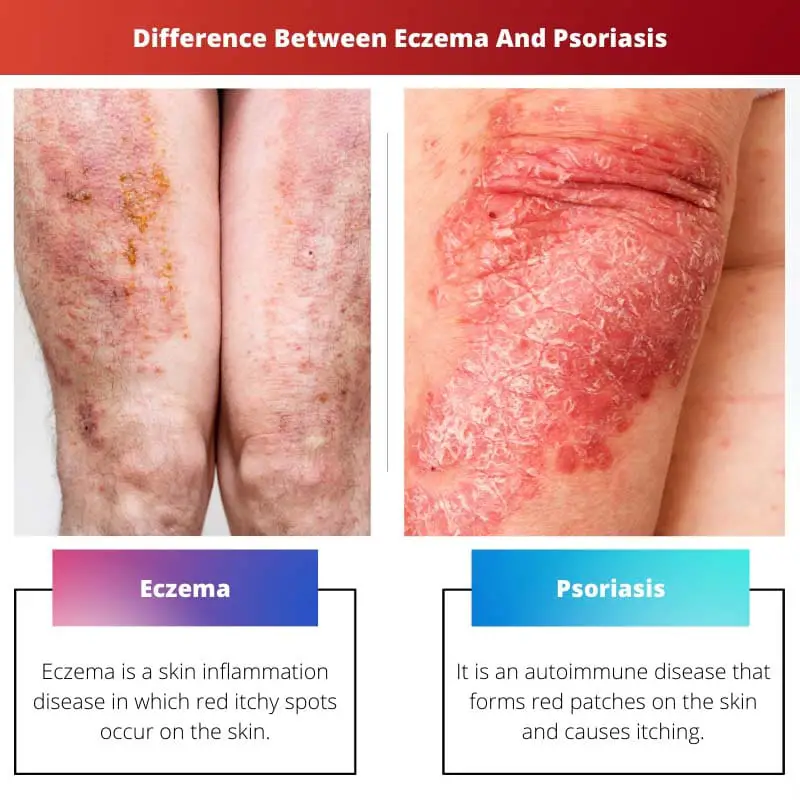Eczema and Psoriasis are skin diseases that cause the skin to burn or itch. The main symptom of both of these diseases is itchy skin and rashes. And therefore, both of them can be confused easily.
One of the most significant differences between eczema and psoriasis is their treatment. The key differences between the two are mentioned below.
Key Takeaways
- Eczema presents as red, inflamed, and itchy skin; psoriasis is thick, red patches with silvery scales.
- Eczema results from environmental factors or allergies; psoriasis stems from an overactive immune system.
- Treatment for eczema focuses on moisturizing the skin and avoiding triggers; psoriasis treatments include topical creams, light therapy, and medications.
Eczema vs Psoriasis
Eczema is a group of skin conditions caused by environmental factors or allergens that cause dry, intensely itchy, irritated skin. Psoriasis is a skin condition that can be caused by various health conditions and results in a rash and flaky, scaly skin patches. It has milder itching than eczema.

There is no cure for psoriasis. However, many treatments can be used to treat the underlying cause. Side effects can occur with some treatments for psoriasis. They are best used when the condition has become more severe.
A variety of topical creams and lotions can help control the symptoms of psoriasis. Many people find relief from a topical prescription medication available in the market.
Eczema is an itchy inflammation of the skin. It occurs in people with a family history of this condition or allergies. Certain creams and ointments are available in the market, which can help relieve eczema.
Comparison Table
| Parameters of Comparison | Eczema | Psoriasis |
|---|---|---|
| What are they? | Eczema is a skin inflammation disease in which red itchy spots occur on the skin. | It is an autoimmune disease that forms red patches on the skin and causes itching. |
| Cause | The cause of eczema can be either genetic or environmental factors like allergies. | Red itchy spots on the scalp, buttocks, elbows, face, etc. Psoriasis causes terrible burns and cab be very itching. |
| Symptoms | Red patchy spots on the back of the knees or underarms. | Doctors prescribed ointments and creams. |
| Diagnosis | Eczema is self-diagnosable. | Psoriasis requires a medical diagnosis. |
| Treatment | Psoriasis can be treated with creams, but it can’t be cured. | Psoriasis can be treated with creams but it can’t be cured. |
What is Eczema?
Eczema is a skin disease that irritants or allergies can cause. The causes of eczema are varied. Stress, allergy triggers, or other factors can trigger eczema. Some people have it all year.
Those suffering from eczema should consult with a dermatologist. The doctor may prescribe antibiotics if the rash is due to an infection.
Eczema can cause severe itching,; if you scratch too much, you can bleed, which will be very harmful. Seek medical attention as soon as possible if you have red patches on your body and they itch.
One of the best ways to prevent and treat eczema is to minimise stress’s effects. Avoid overheating your skin. Keep your bedroom cool. Use doonas and other soft blankets when sleeping.
Bath products with perfume or medicated labels should be avoided. Wear soft materials close to your skin and avoid scratching. Make sure to remove clothing labels. Wear rubber gloves with cotton gloves if you have to use chemicals.
If you can’t avoid the irritant, wear a thick emollient ointment to protect your skin. You can use mild emollient creams if soap is not an option. After showers, pat dries the affected area.
Use a dry dressing at night to prevent scratching. The ointment should be applied at bedtime.

What is Psoriasis?
Skin rashes can be caused by an overactive immune system, which results in the rapid growth of skin cells. Normal skin sheds its dead cells every month. However, people who have psoriasis will notice plaques on their skin within three to four days.
These scales can be itchy, itchy, and can sting. These patches can appear on any part of the body, but most commonly, they are found on the scalp and elbows.
A doctor or a dermatologist may diagnose the disease. Plaque psoriasis is a condition that causes a thick red patch with silvery-white scales.
People with this type of rash may experience itching, burning, or bleeding. This can lead to mental problems. In severe cases, psoriasis may even cause joint damage and discomfort.
The symptoms of psoriasis are obvious and are most noticeable when accompanied by an illness or injury. Guttate psoriasis is a common rash on the body’s trunk, but it can also occur on the legs, arms, and scalp.
Inverse psoriasis can be described as small, rough patches of skin. These spots can form where the skin touches another part of the body.
People with psoriasis have other health conditions, such as heart disease, high blood pressure, and type 2 diabetes.

Main Differences Between Eczema And Psoriasis
- Eczema can be treated with the help of a medical professional, while psoriasis can’t be cured.
- Eczema affects the upper layers of the skin, while psoriasis affects the lower layers.
- Eczema resolves in a few days to a month. On the other hand, psoriasis can last for years.
- Self can diagnose eczema, it doesn’t require lab tests. Psoriasis requires a medical diagnosis.
- Eczema occurs on the arms and behind the knees. Psoriasis can occur anywhere on the skin, sometimes even on the skin under nails.

- https://www.karger.com/Article/Abstract/381913
- https://onlinelibrary.wiley.com/doi/abs/10.1111/exd.13077

This is a life-saving post for anyone who is struggling with eczema and psoriasis. Very valuable information.
Very informative post, I didn’t know the main differences between these two illnesses.
Yes, I feel I have a much better understanding of the topic now.
This is just great! I’ve been dealing with eczema for years and I wish I had come across this post earlier.
Yes, it seems to be a post that could help many people with similar conditions.
It would have been cool to have found this information sooner.
I beg to differ, I don’t think the post provides a comprehensive enough view of the illnesses.
The post provides useful information on how to prevent eczema. I’ll take note of those recommendations.
I found this post really educational. It’s important to know the differences between diseases that may appear similar.